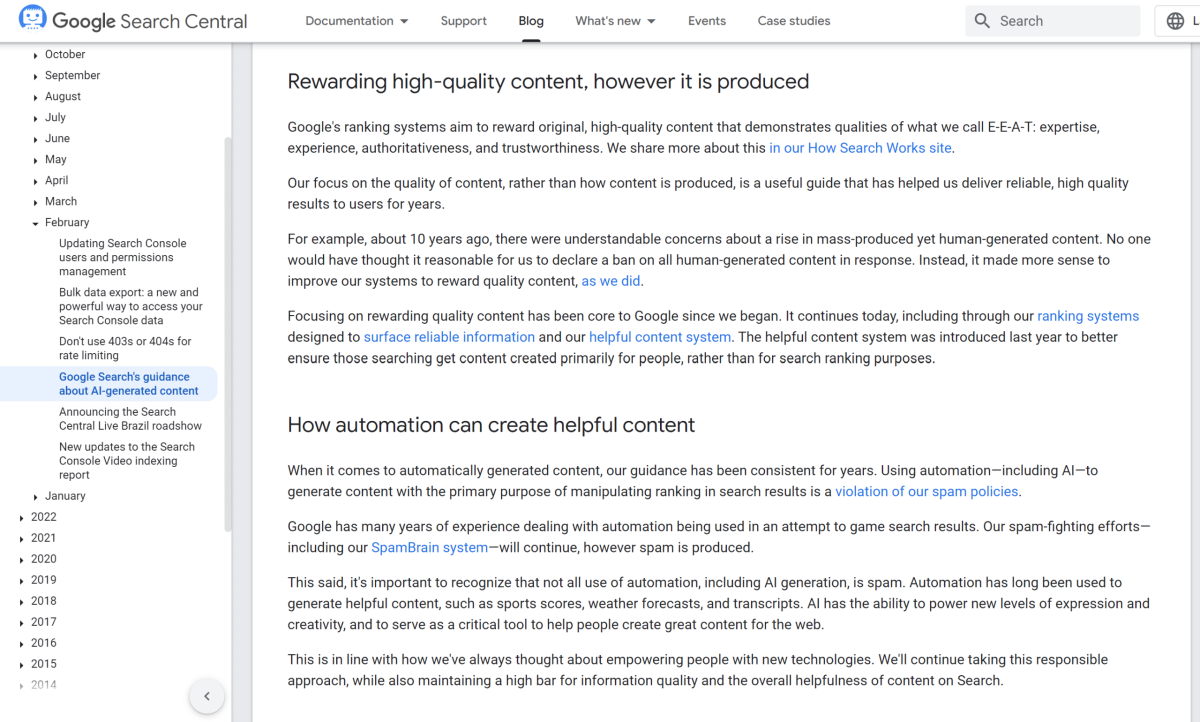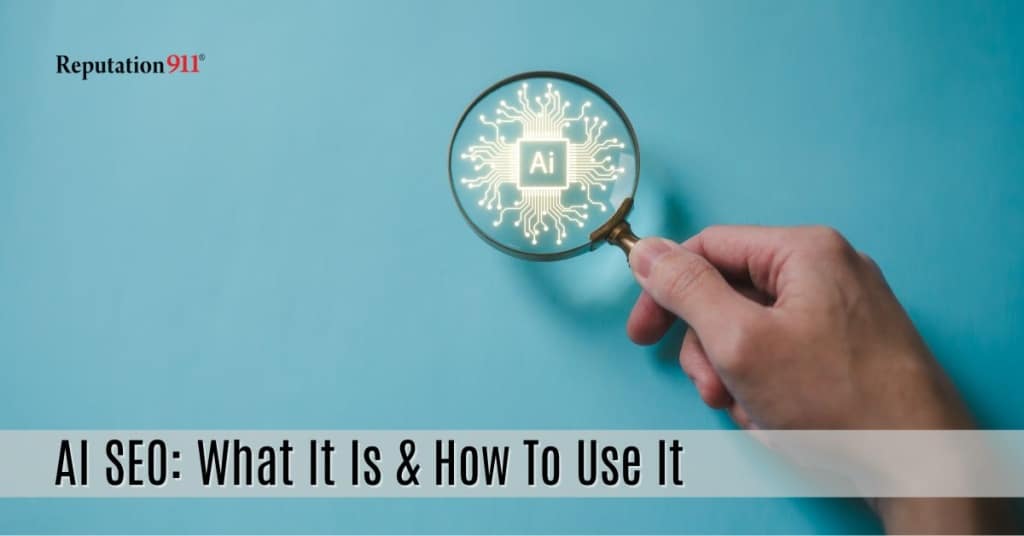Getting high rankings on search engine results pages (SERPs) is a challenge in today’s competitive online world. Traditional search engine optimization techniques and methods are valuable. But, they may not be enough to keep up with evolving search engine algorithms. AI SEO is changing the game, so keep reading to learn what AI SEO is and how to use it.
What Is Artificial Intelligence Search Engine Optimization (AI SEO)?
Artificial Intelligence Search Engine Optimization (AI SEO) basically uses AI-powered tools to enhance and automate your SEO efforts. This can help boost your website rank of the first page of Google by:
- analyzing vast amounts of data
- identifying patterns
- making data-based recommendations
AI search engine optimization may seem like a relatively new concept, but it has actually been evolving for years.
In the beginning, search engine optimization focused on two main areas: keyword optimization and link building. But, as search engine algorithms developed, the focus shifted towards quality content. Essentially, you can’t just publish a blog post full of sketchy backlinks and spammy keywords. Those links and keywords have to make sense and provide value to the reader.
The first AI SEO tool, IBM Watson Analytics, came out way back in 2015. Today, we have a range of tools that already use AI like Moz, SEMrush, HubSpot, etc.
But, there is a reason that people are discussing artificial intelligence SEO like it’s a new thing. Natural language processing. Tools like ChatGPT are revolutionizing this field because of their ability to generate human-like outputs.
Keeping up with the latest search engine optimization developments is critical for SEO Reputation Management.
The Importance of AI SEO
When working together, AI and SEO can boost your website’s rankings in SERPs and organic traffic. Traditional search engine optimization practices are important. But, they might not be enough in the face of evolving search engine algorithms.
The end-goal of a search engine is to always create a better user experience. This means delivering the most relevant content. And lately, that means integrating AI into SERPs, like with Google SGE.
These AI features mean search engine optimization itself is changing. Exact keyword matches won’t matter as much as search intent. As we shift towards Generate Engine Optimization (GEO), AI will become a bigger part of your content strategy. AI tools can help you identify user intent and create content most relevant to that.
Will AI Replace SEO Professionals?
AI is not replacing SEO professionals anytime soon; it’s just changing how these experts do search engine optimization. AI is a tool, and a useful one to help streamline and optimize your process.
If you are already using classic tools like SEMrush, Moz, etc, you’re already leveraging AI! These tools simply work to enhance your capabilities and allow you to focus on more strategic tasks.
Is AI Content Good For SEO?
Many people are worried about whether generative AI content is good or bad for SEO. (We even wrote about the dangers of AI in our AI and Disinformation blog.) But, Google has since published guidance about AI-generated content:

Essentially, Google does not care about how you produce your content. The only thing that matters is that your content has quality, and offers helpful information. Google even says that leveraging these new technologies can be useful.
To create quality (and rank in search engines), your content still needs to follow E-E-A-T. This stands for Expertise, Experience, Authoritativeness, and Trustworthiness. As a content creator, you can’t just tell ChapGPT to write you a blog post about a topic and publish whatever it spits out. You must be strategic about it.

AI SEO Best Practices:
If you are unfamiliar with using AI for SEO optimization, here are some best practices to keep in mind:
- Choose the right tools for your needs. Don’t use SEO AI software just for the sake of it. Think about the areas your team struggles with most. Add SEO AI tools into the systems you already use to give your current techniques a boost.
- Experiment and adjust strategies that aren’t working. AI is evolving all the time, and your content strategies should do the same. Don’t be afraid to experiment with new features and refine your strategies over time.
- AI search engine optimization should always have human oversight. Artificial intelligence can help with content optimizing and creating. But, you still need that human input to maintain quality and relevance.
Related: Learn how to optimize your content for Google Perspectives.
How To Use AI For SEO (5 Tips)
Refine keyword research strategy
AI SEO tools can offer deeper insights into the keywords you should target. This helps you find unique opportunities your competition may not be utilizing.
Without these tools, keyword research can be incredibly time-consuming. But with them, you can analyze large sets of data and understand the nuance of search queries. This helps you find high-potential keywords based on search volume, competition, and user intent.
AI can suggest long-tail keywords and more niche topics that are much easier to rank for, which boosts you organic traffic.
Tools to try:
- SEMrush Keyword Magic Tool: provides extensive keyword suggestions and metrics
- Google Keyword Planner: offers keyword ideas and search volume data, particularly for Google Ad campaigns
- Ahrefs Keywords Explorer: analyzes keyword difficulty and suggests related keywords
- KWFinder: for finding long-tail keywords with low SEO difficulty rating
Optimize your existing content
AI can be a great starting point for writing content. It can help you improve your content to rank higher in search results by suggesting SEO improvements based on best practices. By analyzing your content, it can recommend ways to improve keyword usage, readability, and structure.
They can also help you optimize for voice search (VSEO) by understanding natural language queries. This type of search is becoming more common as more people use digital voice assistants.
Conducting A/B testing is another area where you can utilize artificial intelligence tools. They can generate slightly different versions of titles, meta descriptions, content structures, and more.
Tools to try:
- SEMrush Content Writing Assistant: for real-time SEO recommendations as you write
- RivalFlowAI: for content improvements based on AI-powered analysis
- HubSpot Content Assistant: for suggestions on keyword usage and structural improvements
- Clearscope: for keyword and content suggestions based on natural language processing
Analyze your backlink profile
High-quality backlinks give your website a huge boost in search engines. AI tools for SEO can analyze both the quality and relevance of your backlinks. They can evaluable domain authority, link relevance, anchor text distribution, backlink opportunities, and even potential toxic links.
Tools to try:
- Ahrefs Backlink Checker: for a detailed analysis of your backlink profile, link quality, and referring domains
- Moz Link Explorer: for insights into your and your competitors backlinks
- SEMrush Backlink Analytics: for recommendations on building stronger, more relevant backlinks
- Majestic SEO: for comprehensive backlinks analysis with metrics like Trust Flow and Citation Flow
Create schema markup
Schema markup helps search engines understand the context of your website’s content. AI tools can make it easier to create schema markup that search engines can understand. Using proper schema markup can get your content into rich snippets (like the Google Knowledge Panel), improve clickthrough rates, and boost your rankings.
Tools to try:
- Google’s Structured Data Markup Helper: for generating and testing schema on your website pages
- Schema Markup Generator by Merkle: for creating structured data markup for your website
- Schema App: for creating, managing, and deploying schema across your website
- YoastSEO: a WordPress plugin for generating schema markup
Automate repetitive SEO tasks
Automating repetitive tasks allows you to focus more on content strategy and execution. AI SEO software can help with tasks like website auditing, reporting, and rank tracking to save you time and reduce human error.
AI can also analyze audience data, giving you deeper insights into user behavior and sentiment.
Tools to try:
- MonkeyLearn: for assessing audience sentiment from reviews and social media
- Google Analytics: for analyzing user behavior on your website
- HubSpot’s ChatSpot: for connecting generative AI with customer data
- ScreamingFrog SEO Spider: for automating site audits and generating detailed reports
Conclusion: Leveraging AI SEO
As artificial intelligence evolves, content marketers and digital marketers have to evolve their SEO strategies. Leveraging AI SEO can help you stay ahead of these changes and drive more organic traffic to your website.
Using the most current SEO strategies is the key to getting your positive content to rank highly in search results. At Reputation911, our experts use the latest techniques to suppress your negative search results and protect your reputation. If you need reputational help, get in touch for a free consultation.



